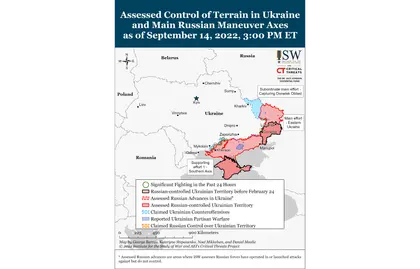Key Takeaways
- Wagner Group financier Yevgeny Prigozhin is being established as the face of the Russian “special military operation” in Ukraine.
- Russian forces likely targeted Ukrainian hydrotechnical infrastructure in Dnipropetrovsk Oblast in order to interfere with Ukraine’s ability to operate across the Inhulets River
- The Ukrainian counteroffensive in eastern Kharkiv Oblast continues to degrade Russian forces and threaten Russian artillery and air defenses.
- Russian and Ukrainian sources reported Ukrainian ground attacks in northern Kherson Oblast, western Kherson Oblast, and northwest of Kherson City but did not report any major gains.
- Russian forces continued ground attacks around Bakhmut and northwest and southwest of Donetsk City.
- Funding volunteer battalions is likely placing financial strain on Russian cities and oblasts.
- Russian occupation authorities shut off mobile internet in occupied Luhansk Oblast on September 14, likely to preserve Russian operational security and better control the information environment as Russian forces, occupation officials, and collaborators flee newly-liberated Kharkiv Oblast for Russian and Russian-controlled territories.
Wagner Group financier Yevgeny Prigozhin is being established as the face of the Russian “special military operation” in Ukraine. Prigozhin gave a recruitment speech on September 14 announcing that Russian prisoners have been participating in the war since July 1 when they were instrumental in seizing the Vuhlehirska Thermal Power Plant.[1] A Russian milblogger noted that Prigozhin is introducing a “Stalinist” method that allows the Kremlin to avoid ordering a general mobilization that could ignite social tensions in Russian society.[2] Milbloggers have been consistently praising Prigozhin’s success in Ukraine and some even said that he should replace the Russian Defense Minister Sergey Shoigu, whom milbloggers and Kremlin pundits blame for the Russian defeat around Kharkiv Oblast.[3] Russian military correspondent and milblogger Maksim Fomin (alias Vladlen Tatarsky) claimed to have spoken to Prigozhin about the situation on the Ukrainian-Russian border after the withdrawal of Russian forces in the area.[4] The Prigozhin-Fomin meeting, if it occurred, could indicate that the Kremlin is attempting to address milbloggers’ months-long complaints that the Russian Defense Ministry did not hear their criticism highlighting the ineffectiveness of Russian higher command. Prigozhin is Putin’s close confidant, and his developing relationship with milbloggers may help retain milblogger support for the Kremlin’s war effort while scapegoating Shoigu and the Russian Defense Ministry for the defeat around Kharkiv Oblast. ISW previously assessed that the Kremlin has changed its information approach to address the demands of the Russian milbloggers and nationalists’, suggesting that Putin seeks to win back the critical milblogger community alienated by Russian failures.[5]
JOIN US ON TELEGRAM
Follow our coverage of the war on the @Kyivpost_official.

EU Transfers €1.5 Bln Raised From Russian Assets for Ukraine
Russian forces likely targeted Ukrainian hydrotechnical infrastructure in western Dnipropetrovsk Oblast on September 14 to interfere with Ukrainian operations across the Inhulets River. Ukrainian sources reported that eight Russian cruise missiles struck unspecified targets in Kryvyi Rih, Dnipropetrovsk Oblast, and caused extensive flooding in areas of Kryvyi Rih.[6] Russian sources identified the target location as the Karachun Dam, which sits along the Inhulets River on the western outskirts of Kryvyi Rih.[7] Footage of the aftermath of the strike shows a 2.5m increase in the water level of the Inhulets River, which runs south of Kryvyi Rih and is an important geographical feature for the ongoing Ukrainian counteroffensive along the Kherson-Mykolaiv border.[8] Russian forces likely targeted the Karachun Dam to damage Ukrainian pontoon bridges further downstream, especially in light of recent reports that Ukrainian troops are attempting to expand their bridgehead over the Inhulets River near Davydiv Brid as part of the ongoing Kherson counteroffensive.[9]
Authors: Karolina Hird, Kateryna Stepanenko, Katherine Lawlor, George Barros, and Frederick W. Kagan
See the full report here.
You can also highlight the text and press Ctrl + Enter






